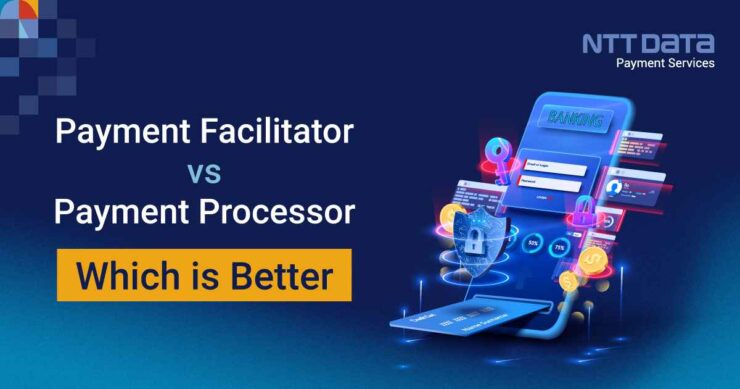
Table of Contents
When you enter the world of payments, you are plagued with new terminology that is self-explanatory. For example, a Payment Facilitator and a Payment Processor may appear the same at first glance, but payment solutions in detail are more complex.
To explore smart payment solutions, it is vital to understand the two terms: payment processing and payment facilitator.
Did you know?
The global payment processing solutions market was valued at $39.57 billion in 2020 and is projected to reach $146.45 billion by 2030, growing at a CAGR of 13.71% from 2021 to 2030.
What is a Payment Facilitator?

A payment facilitator is created to simplify business operations and make online payment gateway effortlessly. In short, a payment facilitator plays a pivotal role of a master merchant that enables easy operations of card transactions and offers the necessary infrastructure to accept credit card payments.
Becoming a payment facilitator provides a better onboarding experience and robust control over the process, ensuring an enhanced customer experience in the long run.
Parties Involved in the Payment Facilitator Ecosystem?
- Payment facilitators: The payment facilitator is the company that sets up the infrastructure for effortless payment transactions
- Submerchant: The sub-merchant is a payment facilitator’s customer, consigned to begin accepting electronic payments.
- Acquiring bank: They are responsible for monitoring the payment facilitator, ensuring compliance with the underwriting procedure, and onboarding sub-merchants.
- Payment processors: A relationship between a processor and the acquiring bank is required to operate as a payment facilitator. The payment processor is responsible for settling transactions initiated by payment facilitator sub-merchants.
Functions of payment Facilitator
- Underwriting and onboarding of payments
- Transaction monitoring and compliance
How does a Payment Facilitator Work?
- The payment facilitator must first open a merchant account with the acquirer.
- As a result, the acquiring bank is in charge of the transaction processing for PayFac customers.
- A payment processor’s job is to ensure that money flows correctly; the payment facilitator must collaborate with the payment processor. The transactions will be checked and transferred to the card network.
- The sponsor ensures that the functions of the processors and acquirers are combined. The payment has to undergo the following process and get approved.
What is a Payment Processor?
A payment processor is located in the middle of the payment cycle. It acts as an important link between the merchant and the financial institutions.
The payment authorization request is sent to a payment processor when a credit card is swiped to make a purchase. The card network receives the payment request. The payment processor performs the verification and transfers to the card network.
In a nutshell, a payment processor is a company that handles credit card transactions between the bank and the merchant. Later the payment processor transmits data from your customer’s card to the customer’s bank.
Parties Involved in the Payment Processing Ecosystem
- Customers.
- Merchant/ business.
- A payment processor.
- Payment gateway.
- Bank/ credit or debit company.
- Merchant account/ business bank.
Also Read:- What Is The Difference Between A Payment Gateway And A Merchant Account?
How does a Payment Processor Work?
- The customer checks and selects credit or debit card payment, providing cardholder information.
- The merchant then sends the required information, of the cardholder, to the respective payment gateway.
- Later the payment gateway forwards the details to the merchant’s third-party payment processor. The payment processor transfers transaction data to the card network.
- The card network will send the transaction details to the customer’s bank, to perform authentication and complete the transaction accordingly.
- A notification is received by the cardholder, indicating whether or not the transaction was approved.
Payment Facilitator Versus Payment Processor
In a nutshell, the distinction between payment facilitator and payment processor is primarily differentiated by the end-to-end customer onboarding and settlement processes. They are crucial during the execution of the payment process and require collaboration while issuing the transaction authentication response from respective parties.
The main advantage of becoming a Payment Facilitator is that you can quickly and easily enroll your application, enabling a smooth onboarding experience. And a payment processor determines the perfect payment alternatives to serve the customers.
India’s leading payment gateway: Working with a full-service payment services provider, such as NTT DATA Payment Services, is the quickest way to get everything you need to start accepting payments online. You can grow your business by integrating with our easy-to-use payment gateway. It’s time for your customers to elevate and enhance their payment experience with our leading payment gateway that offers 360-degree smart payment solutions.
Wrapping Up
You’ll need a platform, a payment processor, a payment gateway, and at least one merchant account to accept payments online. Put, track, monitor, and manage all customer payments in real-time and quickly generate payment reports. So what are you waiting for? Let us help you ace this seamless journey of online payments and deliver a satisfactory user experience.
Payment Facilitator vs Payment Processor FAQs
1. Are payment processors and payment gateways the same thing?
A payment gateway is a third-party service provider liasioning a section of a merchant’s website where customers can enter credit card information securely. A payment gateway ensures that a customer’s credit card is valid. A payment processor sends card information from a merchant’s POS system to the card networks and banks involved in the transaction.
2. What’s the distinction between Payfac and PSP?
A payment Facilitator is a third-party payment service provider (PSP). It would open a sub-merchant account for the merchant and have a contract with the acquiring bank. As a result, it would link the merchant and the acquiring bank.
3. Is a Payment service provider and payment gateway the same?
A payment service provider (PSP) offers payment collection and management services. Whereas a payment gateway is a system that facilitates effective payment transactions between a merchant provider and their customers.


